Unit 7 Food festival Topic 2 I’m not sure whether I can cook it well.SectionC 课件34张
文档属性
| 名称 | Unit 7 Food festival Topic 2 I’m not sure whether I can cook it well.SectionC 课件34张 |

|
|
| 格式 | zip | ||
| 文件大小 | 30.7MB | ||
| 资源类型 | 教案 | ||
| 版本资源 | 仁爱科普版 | ||
| 科目 | 英语 | ||
| 更新时间 | 2019-04-28 00:00:00 | ||
图片预览




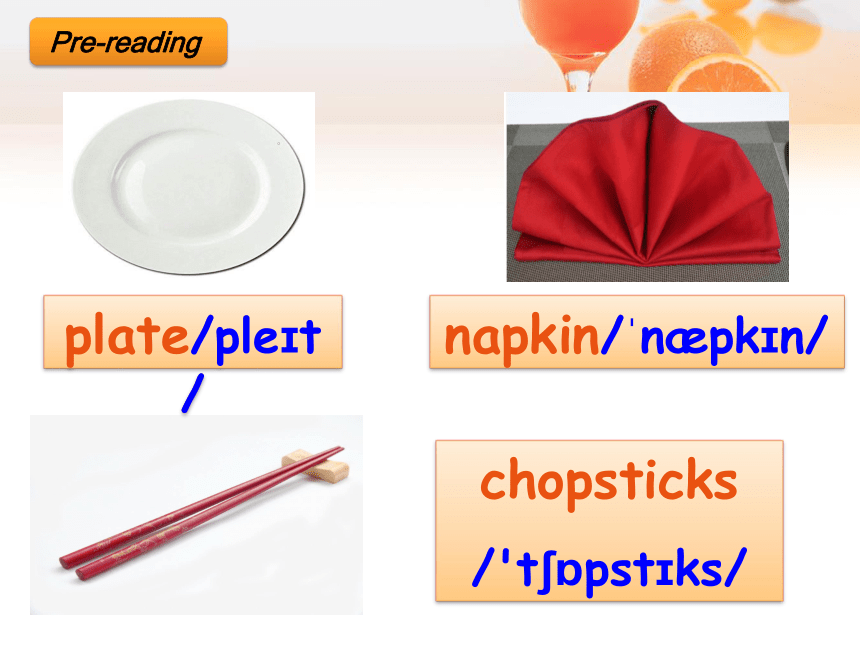
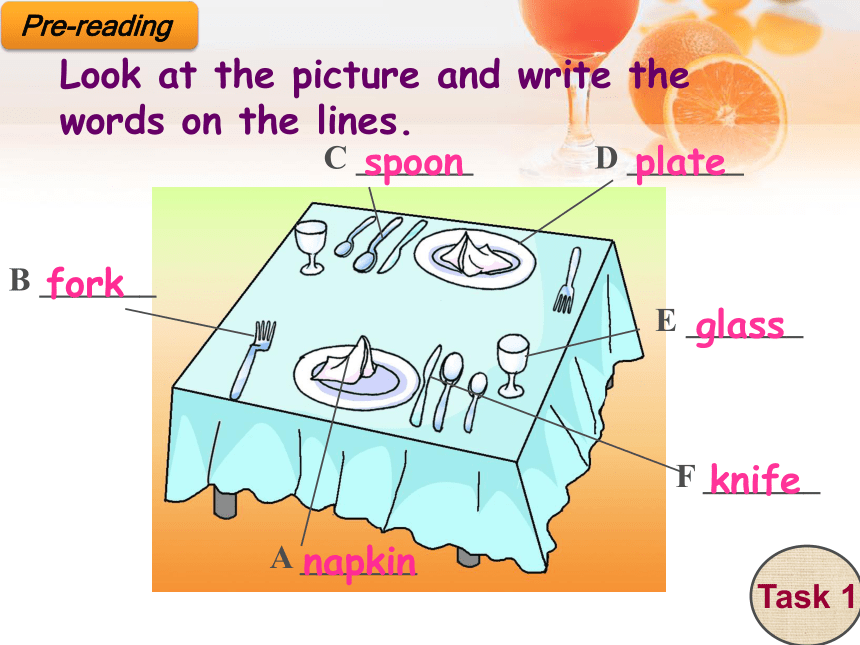
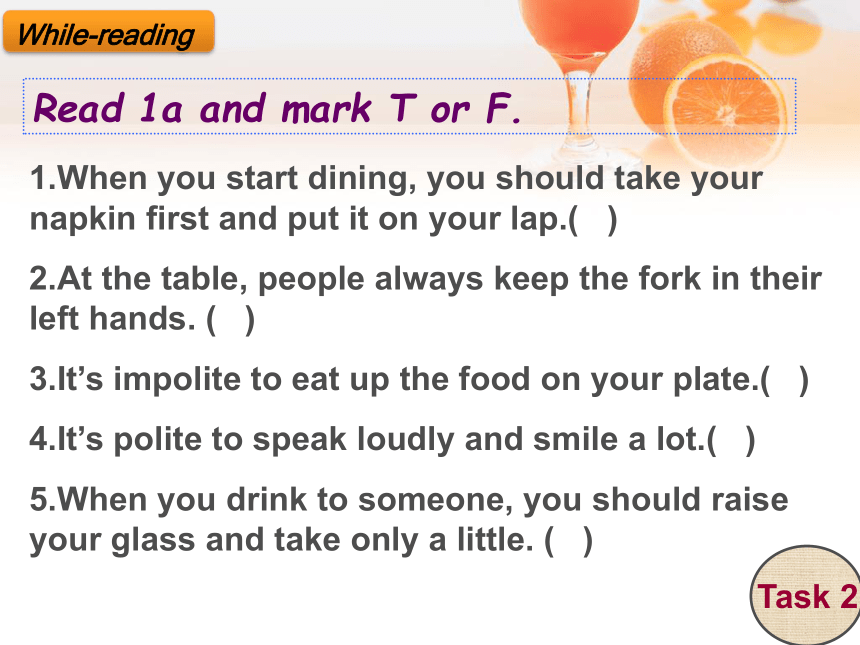
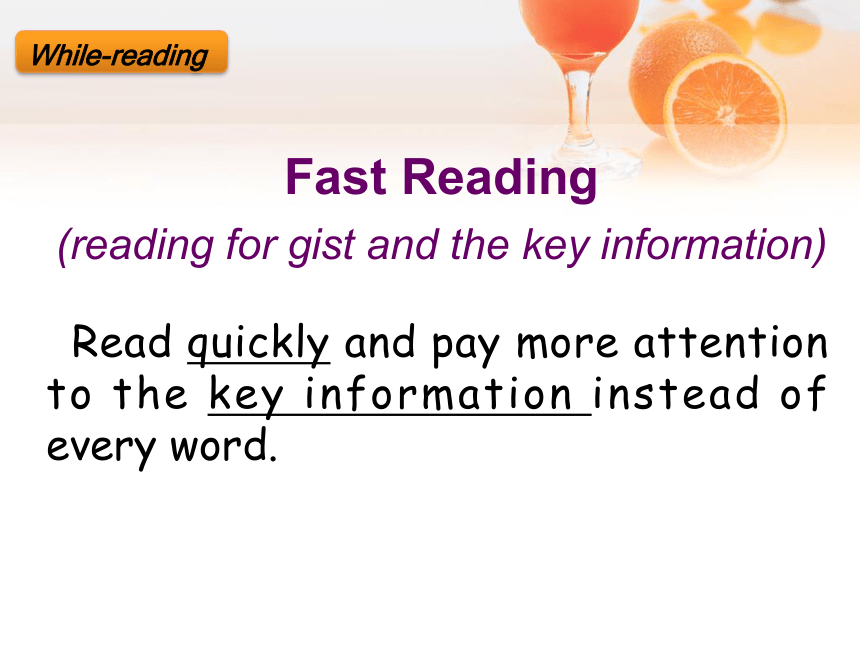
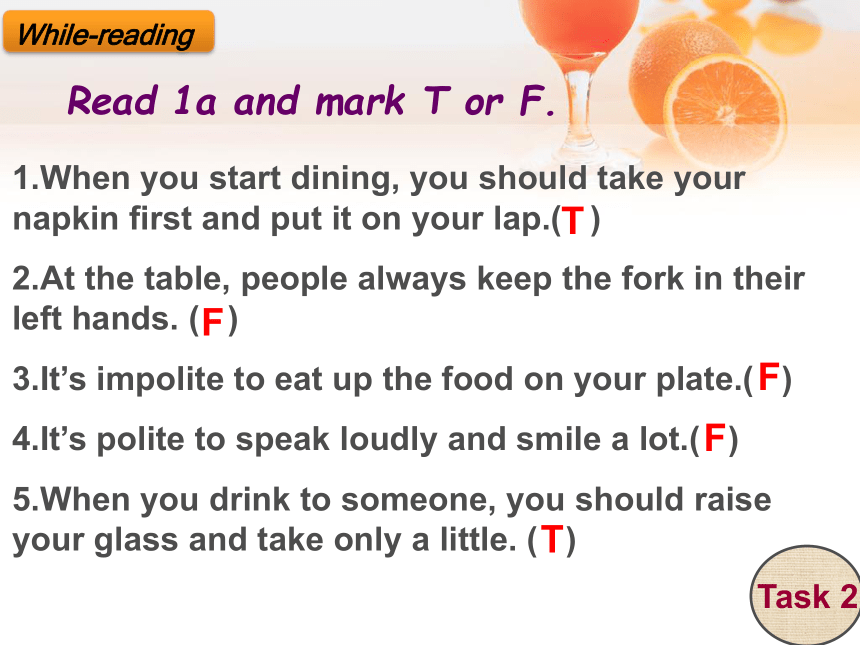

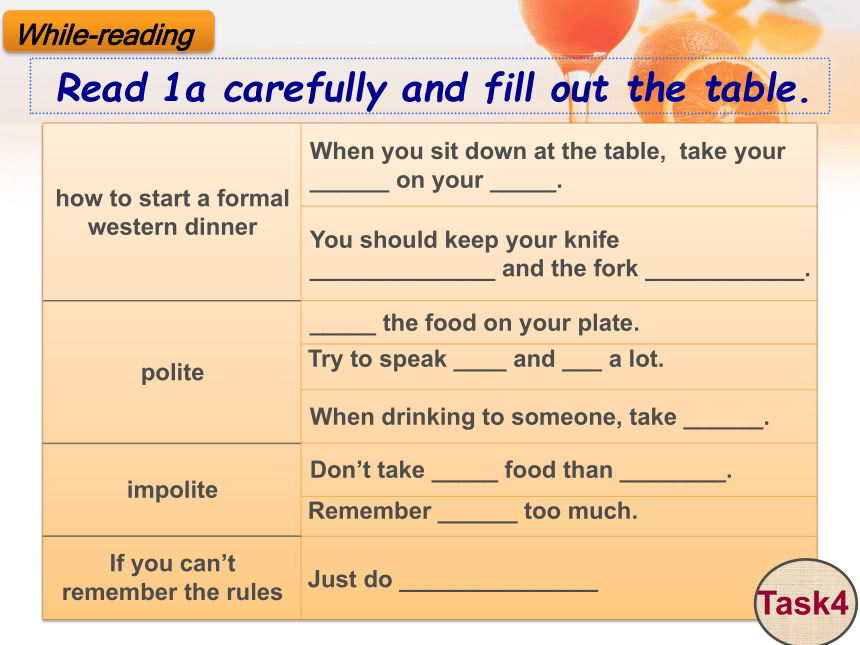
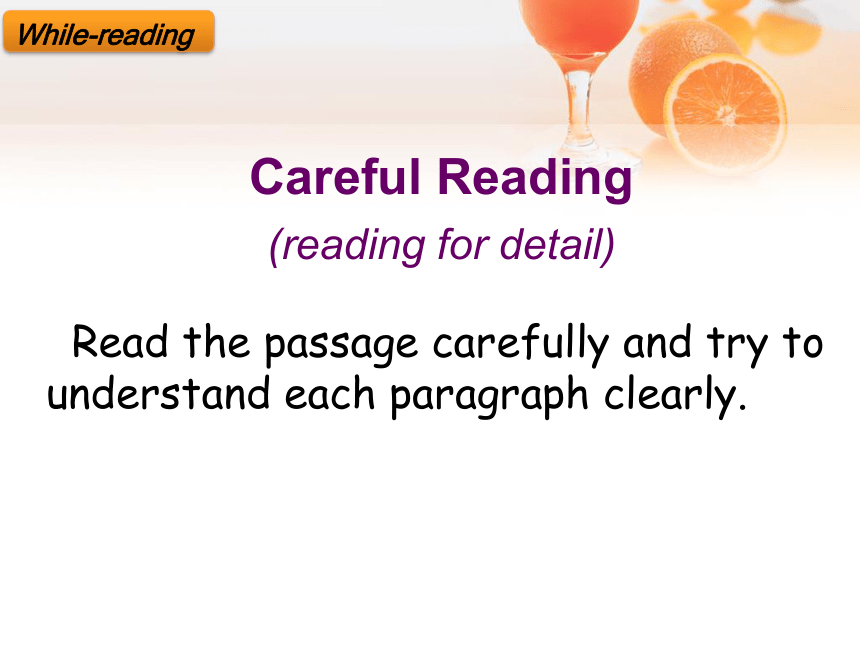
文档简介
Topic2 I’m not sure whether
I can cook it well.
Section C
Unit7 Food Festival
1.starter(开胃菜)
2.soup
3.main course
4.dessert
Pre-reading
spoon/spu:n/
knife/na?f/
fork/f?:k/
glass/glɑ:s/
Pre-reading
napkin/?n?pk?n/
chopsticks
/'t??pst?ks/
plate/ple?t/
A _______
B _______
C _______
D _______
E _______
F _______
napkin
fork
Pre-reading
spoon
plate
glass
knife
Look at the picture and write the words on the lines.
1.When you start dining, you should take your napkin first and put it on your lap.( )
2.At the table, people always keep the fork in their left hands. ( )
3.It’s impolite to eat up the food on your plate.( )
4.It’s polite to speak loudly and smile a lot.( )
5.When you drink to someone, you should raise your glass and take only a little. ( )
While-reading
Read 1a and mark T or F.
Fast Reading
(reading for gist and the key information)
Read quickly and pay more attention to the key information instead of every word.
While-reading
1.When you start dining, you should take your napkin first and put it on your lap.( )
2.At the table, people always keep the fork in their left hands. ( )
3.It’s impolite to eat up the food on your plate.( )
4.It’s polite to speak loudly and smile a lot.( )
5.When you drink to someone, you should raise your glass and take only a little. ( )
T
F
F
F
T
While-reading
Read 1a and mark T or F.
Read 1a again and underline the key points about western table manners.
While-reading
Task3
Read 1a carefully and fill out the table.
While-reading
Task4
Careful Reading
(reading for detail)
Read the passage carefully and try to understand each paragraph clearly.
While-reading
While-reading
napkin
lap
in your right hand
in your left hand
Eat up
quietly
smile
only a little
more
you need
not to
as other people do
Task4
Read 1a carefully and fill out the table.
When you sit down at the table, ...
When you start dinning, …
If you use your knife, ...
The dinner always starts with …
It’s polite to …, so…Don’t take …
You should speak…
When you drink to someone, you’d better...
Remember not to…
Talk about western table manners.
Post-reading
Retell and do!
Talk about table manners in China, then write a short passage.
I think (that) it is polite to … in China.
I think (that) it is impolite to … in China.
I don’t think (that) it is polite to … in China.
You may use these sentences:
Post-reading
Post-reading
Write a short passage about table manners in China, using object clauses and the information you have talked with your partners.
You can begin like this:
Different countries have different table manners. In China, it’s polite to...it’s impolite to… There is no need for…_______________
____________________________________
____________________________________
____________________________________
Different countries have different table manners.
A guest in a Chinese house doesn’t finish a drink.
He usually leaves a little to show that he has had enough.
But in England a guest always finishes a drink to show that he has enjoyed it.
In Japan,
eating noisily means you like the food. The louder, the better.
In America,
if you empty a bottle into someone’s glass,
it obliges(迫使) that person to buy the next bottle.
It’s polite to put the last drops into your own glass.
For wild animals, Kenya is the paradise.
(肯尼亚)
In Britain,
you can use your cutlery(餐具) to signal when you are finished or resting .
When you have finished eating, you can place the knife and fork at 10:20 position.
If you are just pausing, you should place your knife and fork with an inverted(倒置的) V shape.
In Ethiopia(埃塞俄比亚),
Different countries have different table manners.
The world is colorful and wonderful!
When in Rome, do as the Romans do !
Do you know any interesting, and strange table manners from other countries?
Try to list the table manners from other countries and communicate with your classmates after class.
Now
Homework
Thank you!
I can cook it well.
Section C
Unit7 Food Festival
1.starter(开胃菜)
2.soup
3.main course
4.dessert
Pre-reading
spoon/spu:n/
knife/na?f/
fork/f?:k/
glass/glɑ:s/
Pre-reading
napkin/?n?pk?n/
chopsticks
/'t??pst?ks/
plate/ple?t/
A _______
B _______
C _______
D _______
E _______
F _______
napkin
fork
Pre-reading
spoon
plate
glass
knife
Look at the picture and write the words on the lines.
1.When you start dining, you should take your napkin first and put it on your lap.( )
2.At the table, people always keep the fork in their left hands. ( )
3.It’s impolite to eat up the food on your plate.( )
4.It’s polite to speak loudly and smile a lot.( )
5.When you drink to someone, you should raise your glass and take only a little. ( )
While-reading
Read 1a and mark T or F.
Fast Reading
(reading for gist and the key information)
Read quickly and pay more attention to the key information instead of every word.
While-reading
1.When you start dining, you should take your napkin first and put it on your lap.( )
2.At the table, people always keep the fork in their left hands. ( )
3.It’s impolite to eat up the food on your plate.( )
4.It’s polite to speak loudly and smile a lot.( )
5.When you drink to someone, you should raise your glass and take only a little. ( )
T
F
F
F
T
While-reading
Read 1a and mark T or F.
Read 1a again and underline the key points about western table manners.
While-reading
Task3
Read 1a carefully and fill out the table.
While-reading
Task4
Careful Reading
(reading for detail)
Read the passage carefully and try to understand each paragraph clearly.
While-reading
While-reading
napkin
lap
in your right hand
in your left hand
Eat up
quietly
smile
only a little
more
you need
not to
as other people do
Task4
Read 1a carefully and fill out the table.
When you sit down at the table, ...
When you start dinning, …
If you use your knife, ...
The dinner always starts with …
It’s polite to …, so…Don’t take …
You should speak…
When you drink to someone, you’d better...
Remember not to…
Talk about western table manners.
Post-reading
Retell and do!
Talk about table manners in China, then write a short passage.
I think (that) it is polite to … in China.
I think (that) it is impolite to … in China.
I don’t think (that) it is polite to … in China.
You may use these sentences:
Post-reading
Post-reading
Write a short passage about table manners in China, using object clauses and the information you have talked with your partners.
You can begin like this:
Different countries have different table manners. In China, it’s polite to...it’s impolite to… There is no need for…_______________
____________________________________
____________________________________
____________________________________
Different countries have different table manners.
A guest in a Chinese house doesn’t finish a drink.
He usually leaves a little to show that he has had enough.
But in England a guest always finishes a drink to show that he has enjoyed it.
In Japan,
eating noisily means you like the food. The louder, the better.
In America,
if you empty a bottle into someone’s glass,
it obliges(迫使) that person to buy the next bottle.
It’s polite to put the last drops into your own glass.
For wild animals, Kenya is the paradise.
(肯尼亚)
In Britain,
you can use your cutlery(餐具) to signal when you are finished or resting .
When you have finished eating, you can place the knife and fork at 10:20 position.
If you are just pausing, you should place your knife and fork with an inverted(倒置的) V shape.
In Ethiopia(埃塞俄比亚),
Different countries have different table manners.
The world is colorful and wonderful!
When in Rome, do as the Romans do !
Do you know any interesting, and strange table manners from other countries?
Try to list the table manners from other countries and communicate with your classmates after class.
Now
Homework
Thank you!
同课章节目录
- Unit 5 Feeling excited
- Topic 1 You look excited
- Topic 2 I’m feeling better now.
- Topic 3 Many things can affect our feelings.
- Unit 6 Enjoying Cycling
- Topic 1 We're going on a three-day visit to Mount
- Topic 2 How about exploring Tian’anmen Square?
- Topic 3 Bicycle riding is good exercise.
- Unit 7 Food festival
- Topic 1 We’re preparing for a food festival.
- Topic 2 I’m not sure whether I can cook it well.
- Topic 3 I Cooked the Most Successfully
- Unit 8 Our Clothes
- Topic 1 We will have a class fashion show.
- Topic 2 We can design our own uniforms.
- Topic 3 He said the fashion show was wonderful.
